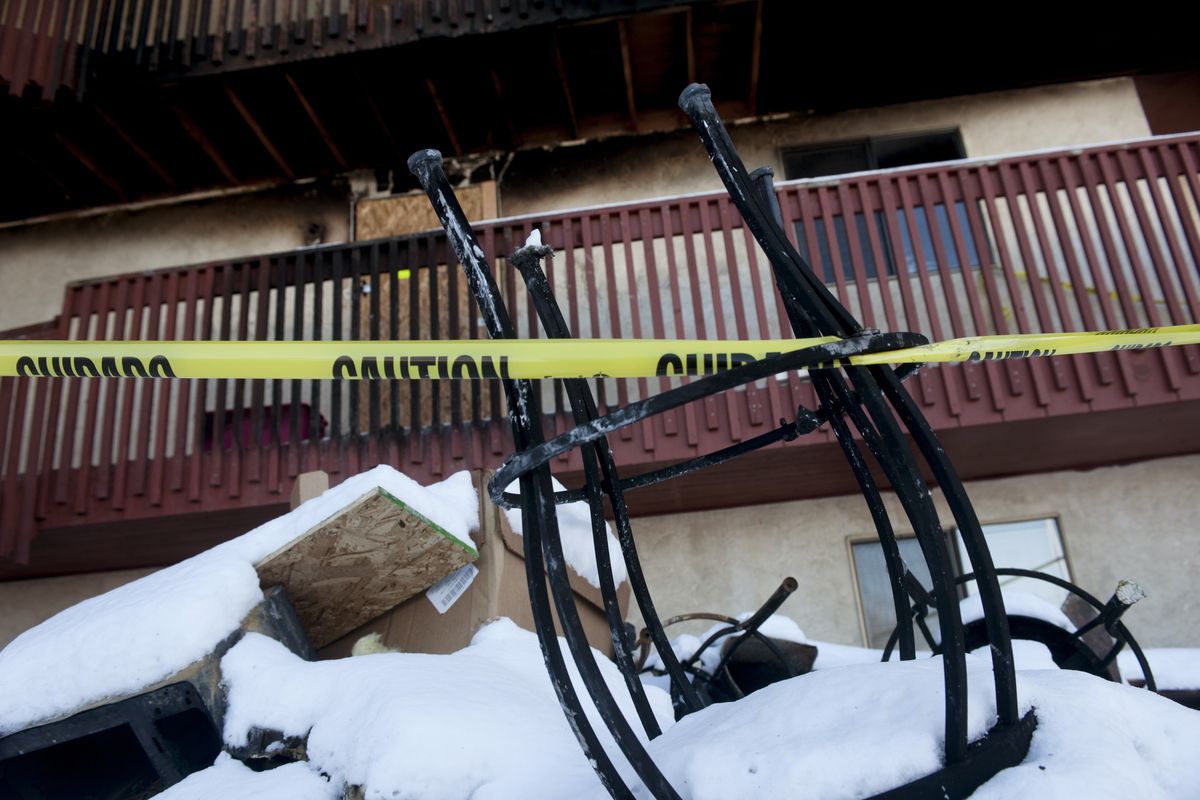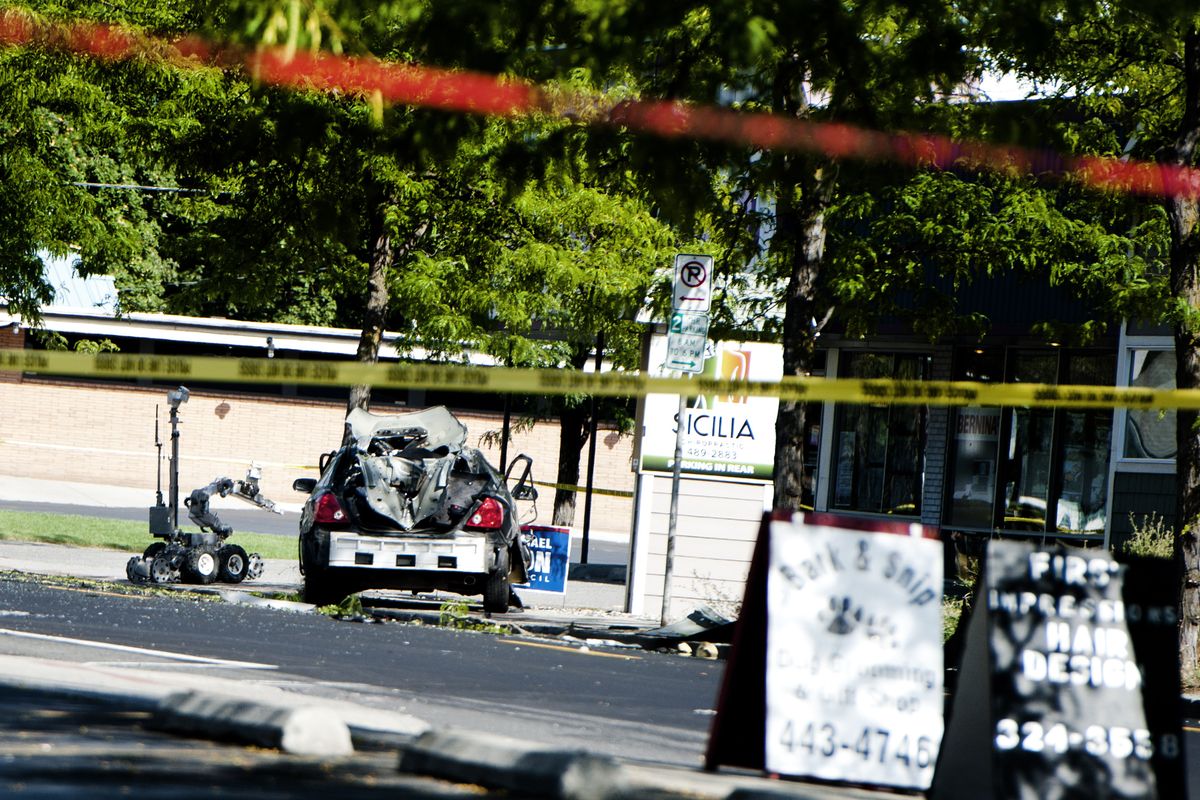Pot extraction method using butane poses hazard
The site where a fire that displaced occupants of two apartments on East Cozza Drive last month is seen on Thursday. (Tyler Tjomsland)Buy a print of this photo
A surge in the production of concentrated marijuana extract is thought to have caused at least three dangerous fires in Spokane County and has local, state and federal officials paying attention.
Investigators say a blaze that sent 30 firefighters to an apartment complex in north Spokane last month was likely caused by someone inside using butane in a process to leach the psychoactive element from marijuana. A similar process caused an explosion in a car traveling through the Garland neighborhood in August, burning a 3-year-old’s hands, face and legs and prompting assault and drug charges against 27-year-old Jacob Sayman.
On Monday, a kitchen fire at 523 S. University Road in Spokane Valley is thought to have been sparked by butane being used in the extraction process. That case has been forwarded to police for investigation, fire officials said.
“We know people are doing this,” Spokane Fire Department Assistant Chief Brian Schaeffer said. “It’s prevalent throughout the Internet.”
Sayman told investigators he was trying to produce “honey oil,” a potent marijuana byproduct that is created by combining hydrocarbons with the plants. The resultant drug contains large proportions of tetrahydrocannabinol, or THC, the element that produces a “high” for users.
Dried marijuana plants often contain a THC concentration of less than 5 percent, while oil extracts can sometimes contain up to four times that much, according to a report by the National Highway Safety Administration.
Scientists have not determined a definitive effect of higher THC concentrations on the brain, though it is generally accepted that the more potent the drug, the more unpredictable the body’s reaction and the greater the likelihood of addiction.
Jodie Underwood, a spokeswoman with the Drug Enforcement Administration field office in Seattle, said tests of some oils in the region have shown THC concentrations of 73 percent. Couple high potencies with the potential for explosions, and the oils become very dangerous, Underwood said.
“It is extremely concerning,” Underwood said. Her agency has not been called in on any investigations in Spokane, she said, but several high-profile explosions have occurred on the West Side as Washington continues to implement rules governing the manufacture and sale of recreational marijuana.
A blast in a Seattle neighborhood earlier in January blew a wall several feet off its foundation, according to the Seattle Times. Firefighters there think butane intended to process marijuana was stored in a freezer and seeped to the base of the refrigerator. When the compressor kicked on it provided the spark needed to ignite the gas.
Last year, investigators said similar circumstances led to a blast at a hotel near SeaWorld in San Diego that injured three people. That explosion and several other high-profile incidents led the San Diego DEA office to release its numbers of so-called “hash oil extraction laboratories” busted in 2013. Agents reported discovering at least 28 such operations in 2013, about half of which had experienced some type of fire.
Such numbers are hard to come by because of a lack of mandatory reporting by local law enforcement agencies, Underwood said. There are plans in place to establish such a system, she said. The agency expects more incidents like Spokane’s apartment fire as the state continues its legalization process.
The state Liquor Control Board, which has been writing the rules for the rollout of legal recreational marijuana, has made policies designed to limit the potential for explosions in the production of legal marijuana extracts. Products such as hash oil must be infused in other products in order to be sold in retail stores, according to the most recent proposed state regulations, and also must be clearly marked with the concentration of THC present in the resulting drug.
Licensed processors may use butane and other flammable hydrocarbons in the production of marijuana extracts, according to the board’s regulations. But they must do so using a “closed-loop” system that limits the flammable gas’s exposure to ignition sources, and production must be on a commercial scale rather than for personal use. Processing must also take place in industrial areas, away from population centers and public facilities like schools and libraries.
“The (Liquor Control Board) is aware of the dangers that can be created by improper extraction, which is why we specifically addressed it in the rules,” board spokesman Brian Smith wrote in an email.
What’s unclear from the Liquor Control Board’s rules is what criminal penalty an unlicensed person producing marijuana extract might face.
Sayman was driving when his concoction of plants, butane, a PVC pipe and a coffee filter exploded as he attempted to light a cigarette with his daughter in the back seat, according to court documents. He faces charges of assault and manufacturing a controlled substance, with a sentencing enhancement because he was within 1,000 feet of a school bus stop.
Sayman pleaded not guilty in court this week and is not in custody.
Investigators are still questioning witnesses in the January apartment fire, and criminal charges are likely, Schaeffer said. But he said the message the Fire Department wants to send is more important than potential criminal liabilities.
“People will get killed using this process,” Schaeffer said.

